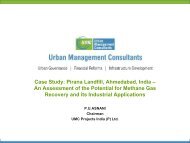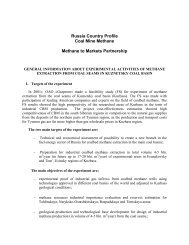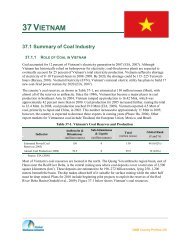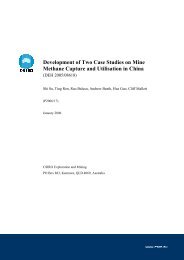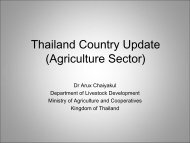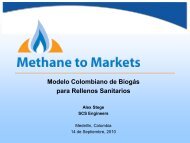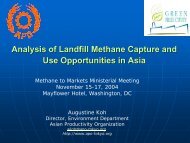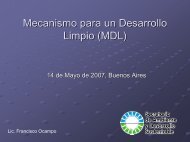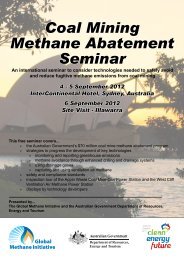Wastewater Management and CDM for Molasses Based Ethanol ...
Wastewater Management and CDM for Molasses Based Ethanol ...
Wastewater Management and CDM for Molasses Based Ethanol ...
You also want an ePaper? Increase the reach of your titles
YUMPU automatically turns print PDFs into web optimized ePapers that Google loves.
<strong>Wastewater</strong> <strong>Management</strong> <strong>and</strong> <strong>CDM</strong><br />
<strong>for</strong> <strong>Molasses</strong> <strong>Based</strong> <strong>Ethanol</strong><br />
Production Plant in the Philippines<br />
Carbon Finance Unit<br />
The World Bank
Key Points<br />
• Partnership between Roxol<br />
Bioenergy Corporation <strong>and</strong> the<br />
World Bank with the ERPA<br />
signed on Jan 14, 2009<br />
• Renewable energy from<br />
methane <strong>and</strong> biogases<br />
replacing heavy fuel oil<br />
• Revision of the ACM 0014 to<br />
allow <strong>for</strong> a “Greenfield” project<br />
• Estimated emission reductions<br />
of 68,000 tCO2e/year <strong>for</strong> this<br />
100,000 liter/day ethanol plant<br />
• A turn-key contract <strong>for</strong> both the<br />
ethanol plant <strong>and</strong> the<br />
wastewater management<br />
system
Roxol Bioenergy Corp<br />
• Roxol Bionergy Corporation Roxol Bionenergy<br />
Corporation is the bioethanol unit of the Roxas<br />
Group. A wholly-owned subsidiary of Roxas<br />
Holdings, Incorporated, the company recently<br />
tapped KBK Chem-Engineering Pvt. Ltd., an Indiabased<br />
firm, <strong>for</strong> the setting up of a turnkey bioethanol<br />
plant in Negros Occidental amounting to about P1<br />
billion.<br />
• The facilities <strong>and</strong> equipment <strong>for</strong> RBC’s plant include<br />
the fermentation <strong>and</strong> distillation in ethanol<br />
production, wastewater treatment, slops<br />
concentration, product storage as well as the steam<br />
boiler <strong>and</strong> turbo-generator components. The plant<br />
will be built next to Central Azucarera de La Carlota,<br />
Inc. (CACI) in La Carlota City, a sugar mill owned by<br />
CADP Group Corporation, a subsidiary of RHI.
ACM 0014 Applicability Scenarios
Roxol <strong>Ethanol</strong> Production <strong>and</strong><br />
<strong>Wastewater</strong> <strong>Management</strong> System
Sources of Emission Reductions<br />
1. Methane avoidance: by using anaerobic<br />
digestion system to capture methane<br />
2. Displacement of Fossil Fuel used in the<br />
<strong>Ethanol</strong> production process:<br />
• By using the methane from the wastewater treatment<br />
system to replace Heavy Fuel Oil (HFO)<br />
• By mixing the vinasse with bagasse to replace HFO<br />
3. Displacement of Electricity from the Grid: using<br />
the methane <strong>and</strong> the vinasses/bagasses<br />
mixture to power the steam turbine (4 MW) <strong>for</strong><br />
internal use
Community Development<br />
Carbon Fund<br />
• The CDCF provides<br />
carbon finance to<br />
projects in poorer<br />
areas of the<br />
developing world that<br />
combine community<br />
development with<br />
investment in clean<br />
energy.
Community Benefits<br />
• The unique feature of CDCF projects has<br />
always been their community development<br />
aspect.<br />
• In its fourth year of operations, the CDCF has<br />
developed stricter criteria <strong>for</strong> assessing<br />
community benefits, reviewing community<br />
benefit plans, ensuring that communities are<br />
consulted <strong>and</strong> participate in defining benefits<br />
<strong>and</strong> verifying that such benefits are in fact<br />
delivered to communities be<strong>for</strong>e payment is<br />
made to the project developer.
Roxol Community Benefit Plan<br />
• This CDCF project will provide additional Community<br />
Benefits to 832 households where more than 40% of<br />
the population lives under US$2 per day.<br />
• Developing under close consultation with the target<br />
communities, the Community Benefit Plan (CBP)<br />
includes:<br />
◦ (i) community organizing, focusing on the <strong>for</strong>mation <strong>and</strong><br />
strengthening of people’s organization <strong>and</strong>/or<br />
cooperatives;<br />
◦ (ii) livelihood <strong>and</strong> entrepreneurial support through a<br />
micro-lending scheme <strong>for</strong> various productive activities;<br />
◦ (iii) health services in the <strong>for</strong>m of quarterly medical<br />
outreach to communities <strong>and</strong> assistance in obtaining<br />
health insurance; <strong>and</strong><br />
◦ (iv) education services such as vocational skills training<br />
<strong>for</strong> out-of-school youths, scholarship grants, a reading<br />
program <strong>and</strong> rehabilitation of the existing preschool/day<br />
care center.
Shared Lessons Learned<br />
• Ensure baseline conditions especially <strong>for</strong> a<br />
greenfield project<br />
• Ensure compliance with environment <strong>and</strong> social<br />
safeguard of the Philippines <strong>and</strong> the World Bank<br />
• Professionally designed <strong>and</strong> implemented waste<br />
treatment system to optimize the biogas<br />
generation<br />
• Stakeholder consultation <strong>and</strong> participation in the<br />
design of the community benefit package
Thank you<br />
Carbon Finance Unit<br />
The World Bank<br />
Please send questions/comments to<br />
Nat Pinnoi at npinnoi@worldbank.org<br />
http://www.carbonfinance.org



